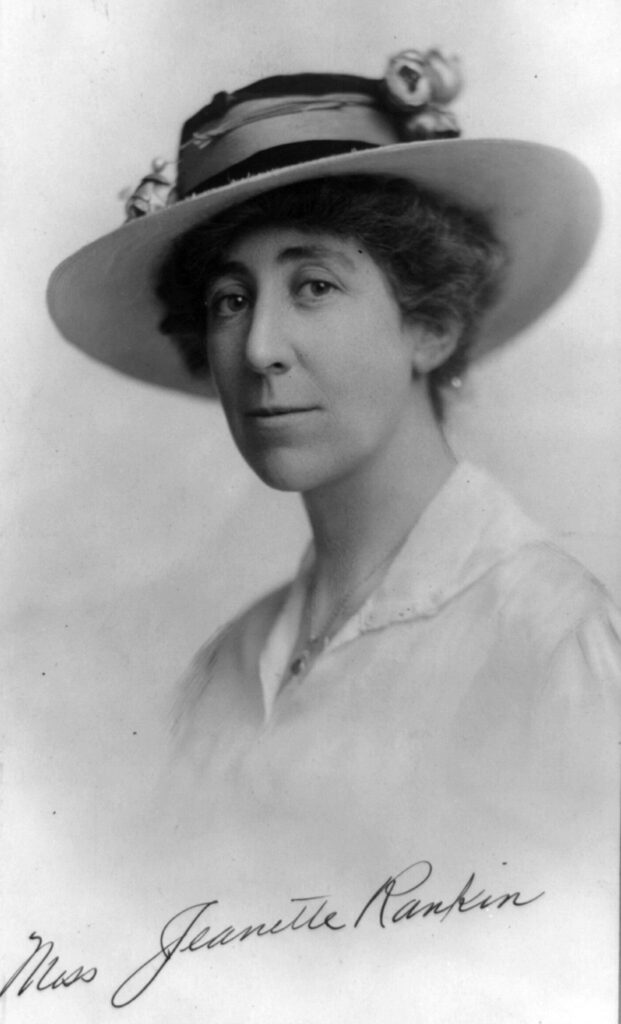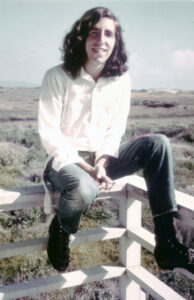Jeannette Rankin: My Inspiration
“How can people in other countries who are trying
to grasp our plan of democracy avoid stumbling over
our logic when we deny the first steps in democracy
to our women?” Jeannette Rankin
 June 11 is Jeannette Rankin’s birthday and her example of nonviolence would later lead me to my work to uncover the little known history of the women’s suffrage movement.
June 11 is Jeannette Rankin’s birthday and her example of nonviolence would later lead me to my work to uncover the little known history of the women’s suffrage movement.
When I was a student in 1968 during the Vietnam War, I had to decide whether to claim a student deferment or not. When I realized that the war was unjustifiable, I decided to stop cooperating with the draft and to refuse the deferment that favored college kids. It was the only thing I knew I could do to try to stop the war, even at the risk of five years in prison.
Resisting the draft led me to Joan Baez’s Institute for the Study of Nonviolence (now the Resource Center for Nonviolence) and a whole new world. There, I learned about peacemakers like Dorothy Day, Jane Addams, and Jeannette Rankin.
Although most well known for her role in the women’s suffrage movement and as a trailblazing politician, it was her dedication to pacifism that truly defined her life. Shortly after her Congressional term began, President Wilson addressed a joint session, asking Congress for a declaration of war on Germany. Rankin was one of 50 who voted in opposition, saying “I wish to stand for my Country, but I cannot vote for war.” As the only woman, she took the brunt of the criticism despite there being 49 men who also voted against the declaration.
When her term ended, she worked as a lobbyist for pacifist organizations, giving speeches across the country for the Women’s Peace Union and the National Council for the Prevention of War, and even testified before Congressional committees several times in opposition to measures intended to increase the country’s preparedness for joining the fighting in World War II, prior to the bombing of Pearl Harbor.
She frequently visited India where she studied the pacifist teachings of Mohandas Gandhi, and continued to speak out against war and promote peaceful resolutions to international conflicts. In the 1960s, many of my generation were inspired by her lifelong dedication to pacifism. It wasn’t until a few years later that I learned about the fullness of her role in women’s history.
Before that, I had another woman Champion who showed up unexpectedly and upset the government’s plan to put me in jail. That happened during my trial for refusing induction in San Francisco in 1972.
 When a member of the jury fell sick early in the trial, the judge seated one of the alternates. She was younger than anyone already on the jury, most of whom were retired, and she wasn’t questioned as closely as the others. When asked, most had admitted they really didn’t have any opinion about the Vietnam War, for or against. This, sadly, after more than five years of relentless and horrific bombing, burning and killing.
When a member of the jury fell sick early in the trial, the judge seated one of the alternates. She was younger than anyone already on the jury, most of whom were retired, and she wasn’t questioned as closely as the others. When asked, most had admitted they really didn’t have any opinion about the Vietnam War, for or against. This, sadly, after more than five years of relentless and horrific bombing, burning and killing.
The jury heard the government’s case and my defense, which was basically that I had no intent to break the law but had to do what I believed was morally right. It didn’t take long. The jury went out and I fully expected what usually happened in draft trials – a short break, a quick decision, and a guilty verdict. Instead, the hours went by.
Towards midnight, the foreman announced the jury was hopelessly deadlocked, forcing the judge to declare a mistrial. By the elevators, friends spoke with the alternate. She proudly admitted that she had deliberately dressed up and come when summoned, hoping to land a political trial so she could make her voice heard.
In the jury room, she had insisted that I had done nothing wrong and didn’t deserve being sent to prison. In the face of the conservative foreman’s pressure, she finally announced that she would “vote ‘No’ until Hell freezes over.”
It was a completely unexpected development, revealing the deep grassroots impact of the peace movement – and a Champion I’ve never forgotten.
The new documentary The Boys Who Said NO! Draft Resistance and the Vietnam War examines this time and the importance of those who stand for peace in time of war.
Jeannette Rankin was one of our 1990 and 1992 Women’s History Honorees.
Jeannette Rankin (June 11, 1880 – May 18, 1973)
Member of Congress, Suffragist, Peace Activist
Rankin began her political work in Montana when she led the successful campaign for woman suffrage in 1914. In 1916, running on a pro-suffrage and anti-war platform, she became the first woman elected to the US Congress. She voted against entering WWI and then worked for improved pay and better conditions for women in government. Elected to Congress again in 1940, she voted against entering World War II. In 1967, she led the Jeannette Rankin Brigade in a demonstration against the Vietnam War.
